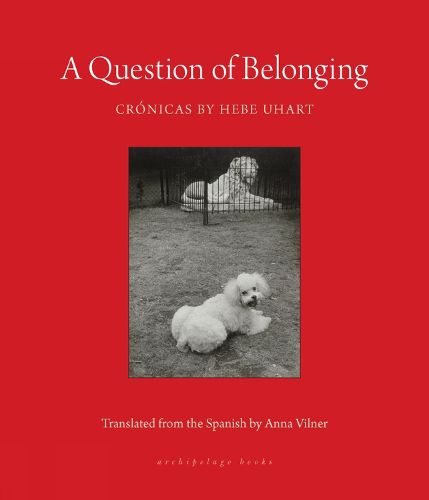Readings Newsletter
Become a Readings Member to make your shopping experience even easier.
Sign in or sign up for free!
You’re not far away from qualifying for FREE standard shipping within Australia
You’ve qualified for FREE standard shipping within Australia
The cart is loading…






"An exemplary compendium of brief glimpses into the quotidian concerns of everyday South Americans . . . that exudes the author's characteristically bright insight and sense of attentive amusement." - Kirkus Reviews, starred review
25 Cr nicas - uniquely Latin American short stories - from a master of the form, a star heralded alongside Samanta Schweblin and Mariana Enriquez for blending insight, honesty, and humor
"An exemplary compendium of brief glimpses into the quotidian concerns of everyday South Americans . . . that exudes the author's characteristically bright insight and sense of attentive amusement." - Kirkus Reviews, starred review
25 Cr nicas - uniquely Latin American short stories - from a master of the form, a star heralded alongside Samanta Schweblin and Mariana Enriquez for blending insight, honesty, and humor
Uhart reinvigorates our desire to connect with other people, to love the world, to laugh in the face of bad intentions, and to look again, more closely- from lapwings, road-side pedicures, and the overheard conversations of nurses and their patients, to Goethe and the work of the Bolivian director Jorge Sanjines.
"It was a year of great discovery for me, learning about these people and their homes," Hebe Uhart writes in the opening story of A Question of Belonging, a collection of texts that traverse Argentina, Paraguay, Brazil, Spain, and beyond. Discoveries sprout and flower throughout Uhart's oeuvre, but nowhere more so than in her cr nicas, Uhart's preferred method of storytelling by the end of her life. For Uhart, the cr nica meant going outside, meeting others. It also allowed the mingling of precise, factual reportage and the slanted, symbolic narrative power of literature.
Here, Uhart opens the door on all kinds of people. We meet an eccentric priest who conducts experiments down by the riverside hoping to land on a cure for cancer; a queenly (read- beautiful and relentlessly indolent) teenage girl; a cacique of the Pueblo Naci n Charroa clan, who tells her of indigenous customs and histories.
She writes with characteristic slyness. In the last lines of the title story, Uhart writes, "And I left, whistling softly." Wherever she may have gone, we are left with the wish we could follow alongside.
$9.00 standard shipping within Australia
FREE standard shipping within Australia for orders over $100.00
Express & International shipping calculated at checkout
Stock availability can be subject to change without notice. We recommend calling the shop or contacting our online team to check availability of low stock items. Please see our Shopping Online page for more details.
"An exemplary compendium of brief glimpses into the quotidian concerns of everyday South Americans . . . that exudes the author's characteristically bright insight and sense of attentive amusement." - Kirkus Reviews, starred review
25 Cr nicas - uniquely Latin American short stories - from a master of the form, a star heralded alongside Samanta Schweblin and Mariana Enriquez for blending insight, honesty, and humor
"An exemplary compendium of brief glimpses into the quotidian concerns of everyday South Americans . . . that exudes the author's characteristically bright insight and sense of attentive amusement." - Kirkus Reviews, starred review
25 Cr nicas - uniquely Latin American short stories - from a master of the form, a star heralded alongside Samanta Schweblin and Mariana Enriquez for blending insight, honesty, and humor
Uhart reinvigorates our desire to connect with other people, to love the world, to laugh in the face of bad intentions, and to look again, more closely- from lapwings, road-side pedicures, and the overheard conversations of nurses and their patients, to Goethe and the work of the Bolivian director Jorge Sanjines.
"It was a year of great discovery for me, learning about these people and their homes," Hebe Uhart writes in the opening story of A Question of Belonging, a collection of texts that traverse Argentina, Paraguay, Brazil, Spain, and beyond. Discoveries sprout and flower throughout Uhart's oeuvre, but nowhere more so than in her cr nicas, Uhart's preferred method of storytelling by the end of her life. For Uhart, the cr nica meant going outside, meeting others. It also allowed the mingling of precise, factual reportage and the slanted, symbolic narrative power of literature.
Here, Uhart opens the door on all kinds of people. We meet an eccentric priest who conducts experiments down by the riverside hoping to land on a cure for cancer; a queenly (read- beautiful and relentlessly indolent) teenage girl; a cacique of the Pueblo Naci n Charroa clan, who tells her of indigenous customs and histories.
She writes with characteristic slyness. In the last lines of the title story, Uhart writes, "And I left, whistling softly." Wherever she may have gone, we are left with the wish we could follow alongside.